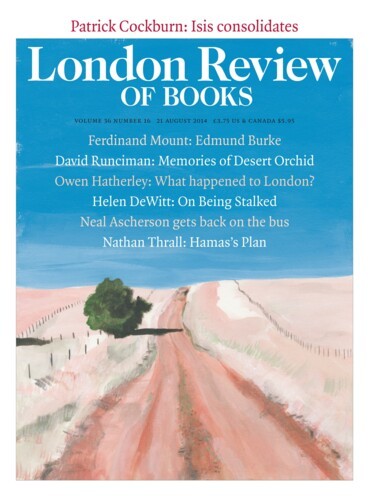A small army of gods stands at the edge of a river, grasping at a salmon which dips and dives, teasing them. When they finally catch it, the fish turns into a boy with bright eyes and red hair: Loki, who tricked blind Hodr into killing his brother – Baldr, the god of light – with a mistletoe-tipped arrow. Later, a wolf swallows the sun and the nine worlds come to an end. The woman telling the story is dressed in black, standing with a drum on an empty stage. Her name is Emily Parrish and she does this for a living. We’re listening to her on fold-up chairs on the top floor of an old warehouse, in a bare room with plaster coming off the walls.
Jonah Miller
Jonah Miller is a PhD student at King’s College London.
According to Michael Gove writing in the Daily Mail last week, the First World War ‘has, for many, been seen through the fictional prism of dramas such as Oh! What a Lovely War, The Monocled Mutineer and Blackadder, as a misbegotten shambles’. We watched Blackadder Goes Forth at school. Digging out my old exercise books to find out what else we did, I see that I studied the First World War for a few months in year 9, when I was 14, covering four areas: the causes (plural) of the war, trench warfare, government propaganda and ‘those who wouldn’t fight’ – all no doubt evidence to Gove of the left-wing hijacking of history.
In 1912 a group of workmen demolishing 30-32 Cheapside struck gold. They brought up more than 400 pieces of late Elizabethan and early Stuart jewellery, and sold them to an asthmatic pawnbroker cum museum agent, George Lawrence, a.k.a. Stoney Jack. The entire hoard is on display at the Museum of London until 27 April.
Histories of roguery tend to the tricolon (alliteration optional). Last summer’s Criminal Investigators, Villains and Tricksters followed Of Tricksters, Tyrants and Turncoats, and Rogues, Rascals and Other Villainous Mainers will be published in October. Paul Martin’s Villains, Scoundrels and Rogues: Incredible True Tales of Mischief and Mayhem, out this week, showcases a group of ‘lesser-known Americans’ who are ‘undeniably memorable’. It's a follow-up to Secret Heroes: Everyday Americans Who Shaped Our World, which gets several mentions in the introduction of his new book, alongside ‘English poet John Milton’ who knew, like Martin, that ‘it’s easier to recognise good by knowing evil.’
Streets Full of Suitors: Early Modern Women
Jonah Miller, 21 August 2014
Is it not a prettie thing to carry Wife, Mayde, and Widdow in your pocket, when you may as it were conferre and heare them talke togither when you will? Nay more, drinke togither: yea, and that which is a further matter; utter their minds, chuse Husbands, and censure Complections; and all this in a quiet and friendly sort, betweene themselves and the pinte-pot.
Samuel Rowlands’s
Read anywhere with the London Review of Books app, available now from the App Store for Apple devices, Google Play for Android devices and Amazon for your Kindle Fire.
Sign up to our newsletter
For highlights from the latest issue, our archive and the blog, as well as news, events and exclusive promotions.


